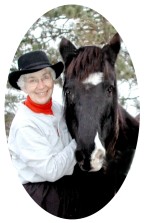Dating online… what do you think?
“Role Playing”… Goodhue County Deputy Tom Wolner and Stanton Township resident Joyce Sheets practice recognizing warning signs of scammers online at a recent Cannon Falls Area TRIAD meeting at the Cannon Valley Senior Center.
***
Believe it or not… your friends and family are dating online.
And why not you ask?
Isn’t that the modern way?
Aren’t you wary enough to avoid problems?
Or… like one man… he said he just enjoyed helping out these women he was in contact with… he didn’t plan to meet up with them… just send a little cash once in a while.
(Anyone know how to meet up with someone like this? Just kidding!)
Jay Haapala, Associate State Director
 – Community Engagement for AARP Minnesota tried to explain to him that he probably wasn’t talking to girls on the internet. Instead they were men who were showing him pictures of pretty girls…and typing into the computer things he would like to hear.
– Community Engagement for AARP Minnesota tried to explain to him that he probably wasn’t talking to girls on the internet. Instead they were men who were showing him pictures of pretty girls…and typing into the computer things he would like to hear.
 – Community Engagement for AARP Minnesota tried to explain to him that he probably wasn’t talking to girls on the internet. Instead they were men who were showing him pictures of pretty girls…and typing into the computer things he would like to hear.
– Community Engagement for AARP Minnesota tried to explain to him that he probably wasn’t talking to girls on the internet. Instead they were men who were showing him pictures of pretty girls…and typing into the computer things he would like to hear.The problem is increasing…
Jay explained that there has been nearly a 250% increase in reports and an over 400% increase in reported losses since 2015. Mainly because more people are willing to share their information.
Like the lady living in Edina. She was an 80 year old widow. A man online said he was a doctor for the United Nations. They talked daily on the internet for eight months. They decided they would get married.
He was coming for a visit so she went to the airport to pick him up.
But he didn’t show. In further correspondence he explained he needed more money because financially, his was tied up.
She sent him $38,000… then $12,000.
She got suspicious and got help and retrieved the $12,000. But not the larger sum.
Warnings:
1) The scammers want you to get in contact with them outside of the dating websites because that website may have rules they don’t want to work with.
2) Don’t send the money.
3) Talk to family and friends.
4) In checking on a contact you’ve made online: start asking them questions and look for inconsistencies in their responses.
For example: Scammers don’t try just one person, they try as many as they can. And so you ask a question you know couldn’t be true like: if they have never mentioned a certain relative, you can ask: “So tell me again, where does you sister Sheila live?”
Since the scammer is telling many lies, to many people, they may have a hard time keeping their story straight. And they might say they don’t know where their sister is right now, etc.
And you will know what you’re dealing with.
Another discovery… Facial recognition online
You have access to facial recognition technology on the internet, called Google Images. You copy a digital picture from someone’s Facebook profile, then scan it onto the internet to look for other pictures like that. (I tried this with my picture and it brought up a dozen or so pictures of men and women but no one identical to me.)
It’s important to report the imposters… to the dating site, Facebook, your local police department or the FBI - Internet Crime Complaint Center IC3.gov,


